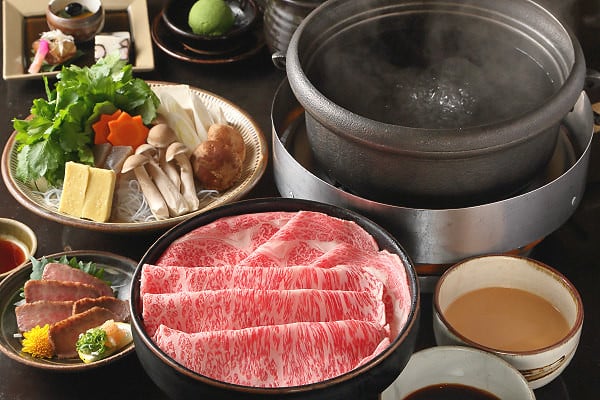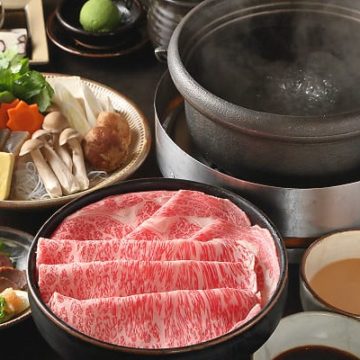Shabu-Shabu
A delicious new use for your fondue pot: Shabu-Shabu. You’ll quickly cook fresh vegetables and paper-thin rib eye in hot and flavorful kombu broth right at the table. To get your rib eyes super thin, freeze them whole until very firm, about 30 minutes, and slice. Or, purchase some sliced rib eyes at an Asian grocery store.
Ingredients
Shabu Sabu Ingredients:
- 4 inches Kombu dried kelp
- 6 cups water
- 3 Tbsp Sake
- 12 oz beef sliced very thinly
- 4 leaves Napa cabbage
- 2 ounces tiny baby bok choy halved vertically
- 2 ounces snow peas
- 3 white long onions
- 6 Shiitake mushrooms
- 1/2 bunch Kikuna or Shungiku edible chrysanthemum leaves
Shabu Shabu dipping sauce:
- 4 Tbsp ground sesame seeds
- 2 Tbsp Soy Sauce
- 2 Tbsp sugar
- 1 Tbsp Rice Vinegar
- 1 Tbsp Miso Paste
- 2 Tbsp water
Instructions
- Mix all the ingredients of the dipping sauce. Set aside.
- In a pot, put dried Kombu in the water, and let it sit for 15 minutes.
- Cut meat into the size you like. Cut cabbage into 2" width pieces, slice white long onion diagonally, cut off the stems of Shiitake mushrooms, and cut Kikuna (Shungiku) into 2" length pieces.
- Dip the meat in the simmering broth until the color turns pink. Cook meat and vegetables as you eat.
Notes
Shabu-shabu was introduced in Japan in the 20th century with the opening of the restaurant "Suehiro" in Osaka, where the name was invented. Its origins are traced back to the Chinese hot pot known as instant-boiled mutton (Shuàn Yángròu). Shabu-shabu is most similar to the original Chinese version when compared to other Japanese hot-pot dishes (nabemono) such as sukiyaki. The president of the restaurant "Suehiro" in Osaka Chūichi Miyake registered the name as a trademark in 1952. Shabu-shabu became more and more popular in the Kansai region and in 1955 it was also added to the menu of restaurants in Tokyo and then spread throughout Japan.
Together with sukiyaki, shabu-shabu is a common dish in many parts of Japan, but also in local Japanese neighborhoods (colloquially called "Little Tokyos") in countries such as the United States and Canada. It is also popular in Taiwan.
Tried this recipe?Let us know how it was!


